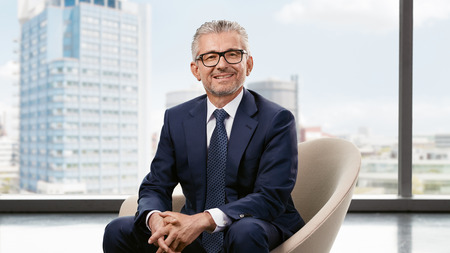Corporate News regarding BY 2020/21

voestalpine delivers positive result and higher liquidity in the business year 2020/21 despite the crisis

voestalpine delivers positive result and higher liquidity in the business year 2020/21 despite the crisis
voestalpine’s business year 2020/21 was defined by an economic downturn of historic proportions. While almost all customer segments saw demand melt away in the first business quarter, starting in the second quarter demand for voestalpine’s products rose once again despite renewed lockdowns in many markets and kept rising throughout the business year. The automotive industry, in particular, showed surprising strength once it emerged from its COVID-19-induced low, triggering substantial growth in demand for high-quality steel products. Aerospace and oil & natural gas were hit particularly hard by the crisis. The Railway Systems business segment, by contrast, developed along a stable trajectory throughout the reporting period. The storage technology segment, for its part, posted all-time high orders thanks to booming online commerce.

In addition to the economic tailwind, the steps we took internally to cut costs and boost efficiency made a decisive contribution to the Group’s positive results for the year. Despite the economic crisis, voestalpine now has more liquidity and less debt than just a year ago. The strengths of our business model were on full display yet again during the COVID-19 crisis. As a result, we will continue to focus on high-tech segments that meet highest quality requirements and drive innovation in collaboration with our customers.
Even though demand for voestalpine’s products rose significantly over the business year 2020/21, the Group’s revenue fell by 11.4% to EUR 11.3 billion on account of economic factors. Similarly to the development of revenue, voestalpine also saw a marked upturn in earnings throughout the subsequent quarters. Given the COVID-19 crisis, the decline in EBITDA by 4% to EUR 1.1 billion was moderate. At EUR 115 million, the Group succeeded once again in posting positive EBIT (2019/20: EUR –89 million). As previously communicated, in the business year 2020/21 (mainly its second quarter) EBIT was impacted by impairment losses of EUR 197 million largely attributable to two companies (voestalpine Texas and voestalpine Tubulars).
Cash flows were extremely positive. The Group succeeded in substantially boosting its cash flow from operating activities to EUR 1.6 billion during the business year ended—especially because it reduced working capital by EUR 633 million. This underscores the voestalpine Group’s strong ability to fund itself even in a difficult market environment.
Following EUR –230 million in the previous business year, profit before tax for the business year 2020/21 is EUR 11 million and thus slightly positive yet again. At EUR 32 million, the voestalpine Group also succeeded in boosting its after-tax profit (2019/20: EUR –216 million).
The gearing ratio (net financial debt as a percentage of equity) improved year over year, from 67.2% to 48.5% as of the end of March 2021. Consistent working capital management and low investment levels enabled voestalpine to significantly reduce its net financial debt in the business year 2020/21 to EUR 2.7 billion, down from EUR 3.8 billion a year earlier. This was the lowest level since the business year 2014/15. At EUR 5.6 billion, equity as of March 31, 2021, was stable year over year (March 31, 2020: EUR 5.6 billion).
As of March 31, 2021, the voestalpine Group had about 48,700 employees (FTE) worldwide, which equates to a year-over-year reduction by 2.1% (1,028 FTE).
Subject to the approval of the Annual General Meeting of voestalpine AG, which will take place on July 7, 2021, a dividend of EUR 0.50 per share will be paid to the company’s shareholders. Relative to voestalpine’s average share price of EUR 24.51 in the business year 2020/21, the dividend yield is 2%.
At EUR 612 million, the volume of investments in the business year 2020/21 was 21.2% lower than the previous business year’s expenditure of EUR 777 million and thus also fell significantly short of depreciation. But voestalpine initiated or pursued important projects nonetheless. A major cutting-edge project named “BETA 3” that involves a new pickling line was launched at our facilities in Linz, Austria. The new “CC4” continuous casting plant, which represents the new core of steel production in Donawitz, Austria, was successfully started up. Both the challenges arising from COVID-19 and delays in deliveries from component suppliers slowed down construction at the world’s most advanced special steel plant in Kapfenberg, Austria. From today’s vantage point, we expect the plant’s construction costs to rise by between 10% and 20% compared with the EUR 350 million investment plan. The project is once again proceeding apace, individual steps such as the cold start-up will be accomplished in calendar year 2021, and the start-up of full operations is slated for the middle of 2022. Given the boom in online commerce, our storage technology segment benefited from investments in welding and assembly facilities in Krems, Austria.
Decarbonizing steel production poses a major technological challenge for the entire European steel industry. voestalpine’s “greentec steel” program clearly charts the way forward. Assuming that there will be sufficient electricity from renewable energy at economical prices, in a first step the shift from coal-based blast furnace production to electric arc technology is expected to bring about a roughly 30% reduction in CO2 by the year 2030. The Group plans to achieve climate-neutral steel production by the year 2050 using green electricity and green hydrogen.
voestalpine — a company considered the benchmark worldwide in both climate change mitigation and environmental protection — has developed a scalable process that supports CO2-neutral steelmaking without a fossil fuel such as coal and has obtained a patent from the European Patent Office for it. Specifically, this patent comprises the production of hot briquetted iron (DRI or HBI) in a direct reduction process by way of green hydrogen and biogas. The Group will grant production licenses for the climate-neutral pre-material.
Currently, demand from almost all of voestalpine’s important customer segments is high; in fact, some areas seem to be overheating due to catch-up effects. Even the oil & natural gas industry, which was hit particularly hard by the crisis, is starting to rebound incrementally. The most that can be expected for the aerospace industry, however, is a slight improvement in the course of the business year 2021/22.
Given positive demand, from today’s vantage point we may expect the economy on the whole to continue along its upward trajectory at least up to the end of calendar year 2021. This assessment also follows the forecasts of economic researchers. In addition, the trillions in EU and U.S. economic stimulus packages that aim to kickstart the economy are expected to provide important impetus for growth after the end of the COVID-19 pandemic.
But the crisis has not yet been overcome. Despite the availability of effective vaccines against the COVID-19 virus and growing immunization coverage, it is difficult to predict how the pandemic and its economic consequences will evolve going forward. The voestalpine Group will once again and increasingly focus on value-added growth over and above its consistent measures to boost efficiency and optimize cash flow.
“Assuming that the current economic momentum will continue and that there will be no new, unexpected distortions of the market, the Management Board of voestalpine AG expects EBITDA for the business year 2021/22 between EUR 1.6 billion and EUR 1.9 billion,” says Eibensteiner.
Key figures of voestalpine Group
|
(gem. IFRS) |
BY 2019/20 |
BY 2020/21 |
Change |
|
|
04/01/2019-03/31/2020 |
04/01/2020-03/31/2021 |
in % |
|
Revenue |
12,717.2 |
11,266.6 |
-11.4 |
|
EBITDA |
1,181.5 |
1,134.5 |
-4.0 |
|
EBITDA margin in % |
9.3% |
10.1% |
|
|
EBIT |
-89,0 |
115.2 |
|
|
EBIT margin in % |
-0.7% |
1.0% |
|
|
Profit before tax |
-230.3 |
10.8 |
|
|
Profit after tax * |
-216.5 |
31.7 |
|
|
EPS (euros) |
-1.24 |
0.24 |
|
|
Gearing-ratio in % (03/31) |
67.2% |
48.5% |
|
|
Mio. EUR |
|||
*Before deduction of non-controlling interests and interest on hybrid capital.